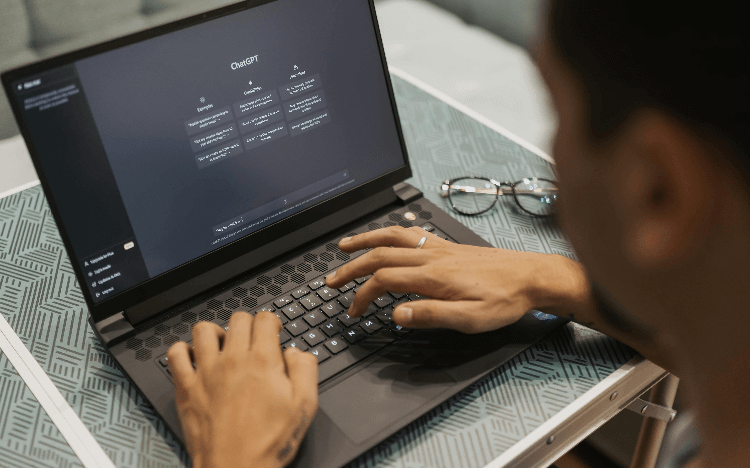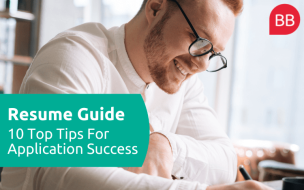However, using artificial intelligence in business comes with risks, from plagiarism to errors to a simple lack of originality. How can business school students and grads avoid these pitfalls to access the benefits of AI tools in their job search?

To find out, we spoke to Dean Wen Mao of Villanova School of Business (pictured right), where career center staff and faculty teach students to use AI to their advantage without incurring costs.
Here are the do’s and don’ts of using artificial intelligence in business school and beyond.
Do gather knowledge and nurture critical thinking skills
One misconception Dean Mao notices about artificial intelligence in business school is that it means students don’t have to gather knowledge because they have AI to “learn” for them.
This isn’t true.
Artificial intelligence in business school settings makes learning faster and easier, but it doesn’t replace the need for knowledge. On the contrary, understanding key business concepts helps students evaluate AI outputs and use the tools more effectively.
“It’s like when the calculator was introduced, or the computer,” she says. “Certain skills may not be as important [anymore] but they still need to understand business functions to use the AI tools.”
Importantly, you should continue developing your knowledge and critical thinking skills over the course of your career. This is why Villanova provides a “Backpack to Briefcase” professional development program to teach students to adapt and become lifelong learners.
Don’t just copy and paste AI-generated material, especially an AI resume
A big mistake that many people make when it comes to artificial intelligence in business is using AI-generated content as the final product of their work instead of a tool to get there.
Generating an AI resume is one example. AI tools can spit out a resume that matches the job specifications, but that doesn’t mean it will get you the job.
“Our staff go to conferences where employers say they occasionally see identical cover letters coming from students [who used AI],” Dean Mao laughs. “If everybody’s using AI, using AI won’t help you stand out.”
Villanova faculty therefore encourage students to use AI resume review tools for feedback rather than writing and teaches them to imbue their application materials with their own authentic voice and creativity.
This also applies to essay and report writing. Remember, if everyone’s plugging the same prompts into the same algorithm, the chances are they’ll produce very similar work. Don’t get caught in this trap.
Do use AI tools to get started or unstuck
Sometimes, people turn to AI resume tools out of a simple case of writer’s block. Dean Mao encourages students to use AI to get out of this mindset, using basic prompts to generate an outline or first paragraph as a jumping-off point to then edit and make their own.
Don’t skip your due diligence
Another important tip from Dean Mao is not to take everything your AI tool generates as gospel. AI is not immune to generating errors or biases, and the only way to weed these out is with good old-fashioned due diligence and fact-checking, going to multiple sources to check information.
“Have the mindset that you are the author of what you write down, with an AI assistant,” she says. “You don’t blame your assistant for mistakes you signed off on. You have to own that content.”
Do learn to use AI, even if you don’t want to work in tech
You might think that all of this is less relevant for you if you aren’t interested in pursuing an artificial intelligence career.
However, the impact of artificial intelligence in business ripples across all industries and functions, meaning that developing AI skills can help you no matter your career path.
According to Dean Mao, the way to do this is to learn two key components:
- The business problems facing your sector or function
- The capabilities—and limitations—of these tools in solving those problems
This mainly requires very human skills like creativity, lateral thinking, and critical judgment.
“[You need to learn] how to apply the tools to a project or specific purpose and understand the limitations and biases of these tools,” she says. “That’s what recruiters are looking for—not complex coders.”
Don’t be afraid of artificial intelligence in business
Dean Mao’s final piece of advice is simple: “Don’t be afraid.”
She stresses that although artificial intelligence has huge potential, it is not human intelligence. “You will not lose your job—as every industrial revolution has indicated, some of the lower level jobs might be replaced, the nature of your job might be different, but new jobs will also be created.
“These new jobs will require that you know about AI, so people who have a good understanding of AI will get better jobs.”
In fact, as artificial intelligence in business becomes more prominent, Dean Mao predicts it will drive up the value of human skills.
“Because AI is going to change the nature of entry-level jobs, that makes certain skill sets more important: interpersonal skills, communication, leadership, and being a team player.”
Image © Matheus Bertelli on Pexels, reproduced under this license








